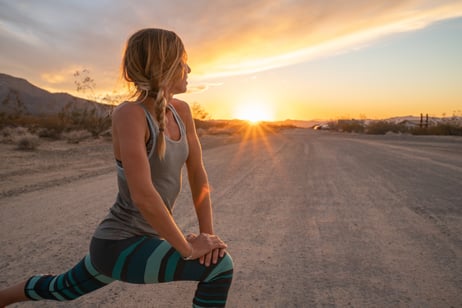 A question I get asked frequently is, “Why are you interning for a fitness center when your major is social work?” The first thing people think of when they hear social work is working at the Department of Child Services, and being in a fitness center doesn’t seem to make sense. But social work is so much bigger than that, and it continues to expand into new places, such as fitness and sports.
A question I get asked frequently is, “Why are you interning for a fitness center when your major is social work?” The first thing people think of when they hear social work is working at the Department of Child Services, and being in a fitness center doesn’t seem to make sense. But social work is so much bigger than that, and it continues to expand into new places, such as fitness and sports.
Linking Physical and Mental Health
Exercise has many benefits for your physical health, but what about benefits to your mental health? In my own experience, I feel that exercising has an effect on my mood. The less I exercise throughout the week, the more sluggish and tired I become. However, the more I exercise throughout the week, the more energized and content I feel.
Now don’t get me wrong—I am not one of those people who loves to work out. I know that may come as a surprise, but I don’t look forward to working out. It’s something that I know I need to do in order to keep myself healthy, but I don’t particularly enjoy it. I literally count down the minutes until my workout is over. But as I said, I notice the difference in myself when I’m not working out vs. when I am working out. Exercising doesn’t have to look the same for everyone, either. Find something that you enjoy doing like hiking or swimming and incorporate that into what a “regular” workout might look like.
How It Works (Out)
Numerous studies back up the claims that exercising improves mental health. Aerobic exercises such as swimming, cycling, and jogging have been shown to reduce anxiety and depression. The improvements in mood are, in part, due to the exercise-induced blood circulation to the brain. Exercise can offer other benefits that help improve your mental health, such as the opportunity to get more social interaction. A smile, a greeting, or a small conversation can help improve your mood or even change the outlook of your entire day. You might even meet a gym buddy who will keep you accountable when you don’t feel like working out.
Working out can also help you gain more confidence overall. When you meet your exercise goals and start to see changes in your appearance, chances are your confidence will build as well. Exercise also gives you a healthy coping mechanism when you are feeling down. Have you been dwelling on something stressful? Take it out on a few medicine ball slams!
Find the Balance
Mental health and physical health are more intertwined than most people realize. Finding a balance between the two can help your overall well-being. It also helps justify why I am interning here at NIFS (lol).
This blog was written by Taylor Hayes. To learn more about the NIFS bloggers, click here.


 It’s safe to say that 2020 has been one a heck of a year (and it’s barely half over!)—the good, the bad, the ugly. At times, it’s felt as if an entire decade has passed. No matter how you slice it, the fact that we’ve experienced something as novel as a global pandemic still feels weird to say, think about, and sometimes fully appreciate. It has been a tumultuous time outside of COVID-19 as well, and every person has had a unique experience, a unique perception, and unique challenges along the way.
It’s safe to say that 2020 has been one a heck of a year (and it’s barely half over!)—the good, the bad, the ugly. At times, it’s felt as if an entire decade has passed. No matter how you slice it, the fact that we’ve experienced something as novel as a global pandemic still feels weird to say, think about, and sometimes fully appreciate. It has been a tumultuous time outside of COVID-19 as well, and every person has had a unique experience, a unique perception, and unique challenges along the way. 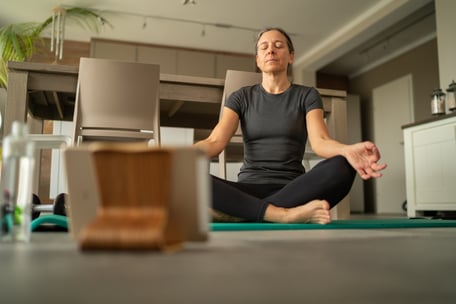 Take these next few weeks or so and use them to your advantage. We know this is an extremely challenging time, and we want to make sure you feel like you are taken care of. Circumstances are tricky right now, so even if you adopt one new technique, consider that a win! Don’t expect yourself to “eat the rainbow” every day, feel like you fall asleep easily at night from a relaxing day working at home in your pajamas, or get in a 10-mile run each morning. While you shelter at home and stay healthy, keep these tips in mind.
Take these next few weeks or so and use them to your advantage. We know this is an extremely challenging time, and we want to make sure you feel like you are taken care of. Circumstances are tricky right now, so even if you adopt one new technique, consider that a win! Don’t expect yourself to “eat the rainbow” every day, feel like you fall asleep easily at night from a relaxing day working at home in your pajamas, or get in a 10-mile run each morning. While you shelter at home and stay healthy, keep these tips in mind.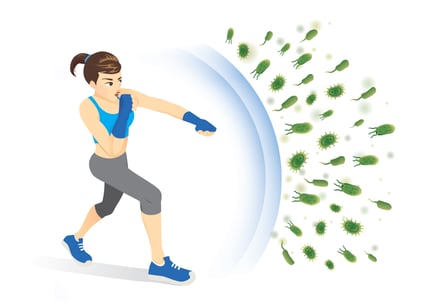 Have you ever noticed that during the cold and flu season, some people just don’t get sick no matter what? Or maybe you have wondered why after being exposed to the same virus, one person gets sick while the other doesn’t.
Have you ever noticed that during the cold and flu season, some people just don’t get sick no matter what? Or maybe you have wondered why after being exposed to the same virus, one person gets sick while the other doesn’t. How many times have you looked back at a day and thought, “Man, I wish I would’ve been more productive,” while your to-do list seems to grow and grow. Or maybe you feel like you were crossing a lot of things off the list, but no meaningful work was actually accomplished? In my experience, it’s almost a weekly occurrence. I feel like I’m flying around at work, checking off boxes. But then I get to the end of my day, scan back through, and realize that I didn’t actually work on any of the big jobs that I had originally intended. Its days like these that made me want to begin a blog series that attacks the idea of productivity: what it actually is, where our pitfalls lie, and how we can improve on it to get more out of each day.
How many times have you looked back at a day and thought, “Man, I wish I would’ve been more productive,” while your to-do list seems to grow and grow. Or maybe you feel like you were crossing a lot of things off the list, but no meaningful work was actually accomplished? In my experience, it’s almost a weekly occurrence. I feel like I’m flying around at work, checking off boxes. But then I get to the end of my day, scan back through, and realize that I didn’t actually work on any of the big jobs that I had originally intended. Its days like these that made me want to begin a blog series that attacks the idea of productivity: what it actually is, where our pitfalls lie, and how we can improve on it to get more out of each day.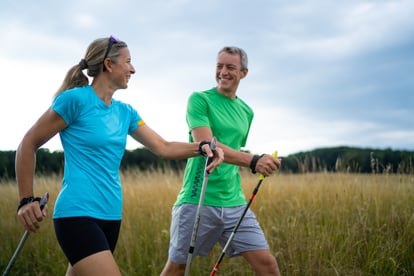 Unless you have been on Mars for the last four or five decades, you have heard, read, and seen the benefits of walking for health and fitness. There is no new hot take on walking; it’s always been a fantastic way to stay healthy and enjoy exercise.
Unless you have been on Mars for the last four or five decades, you have heard, read, and seen the benefits of walking for health and fitness. There is no new hot take on walking; it’s always been a fantastic way to stay healthy and enjoy exercise.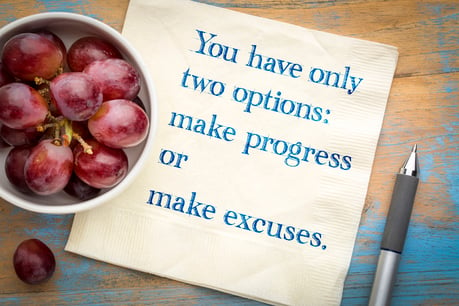 After the New Year, springtime is another time that motivates us to make a fresh start. When the weather finally starts to warm up and the breeze is blowing, we want to throw open the windows and let the rebirth all around us revitalize our homes and our spirits.
After the New Year, springtime is another time that motivates us to make a fresh start. When the weather finally starts to warm up and the breeze is blowing, we want to throw open the windows and let the rebirth all around us revitalize our homes and our spirits.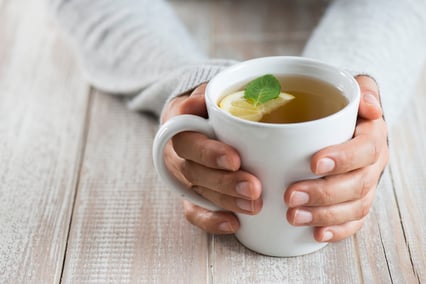 If you are like most people, the dreaded
If you are like most people, the dreaded 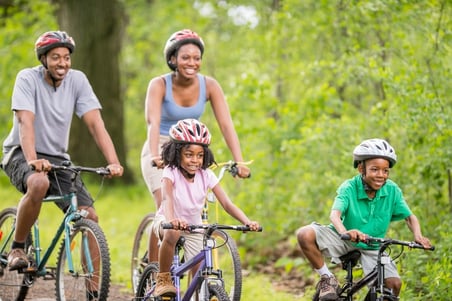 Running, skipping, hopping, bounding, throwing, and crawling are all activities children around the world enjoy and are necessities for proper movement development. Most sports and lifetime fitness activities require one or more of these basic motor skills. Developing basic motor skills sometimes is not our main priority when it comes to our children’s upbringing. In our lifetime, the focus on physical education has somewhat declined due to various reasons, with one reason being a deemphasis on playground time and even family-time physical activity. Beyond physical fitness, there are many other benefits that one can get from being more active, especially at a young age.
Running, skipping, hopping, bounding, throwing, and crawling are all activities children around the world enjoy and are necessities for proper movement development. Most sports and lifetime fitness activities require one or more of these basic motor skills. Developing basic motor skills sometimes is not our main priority when it comes to our children’s upbringing. In our lifetime, the focus on physical education has somewhat declined due to various reasons, with one reason being a deemphasis on playground time and even family-time physical activity. Beyond physical fitness, there are many other benefits that one can get from being more active, especially at a young age. There are many diet personalities out there. If you are one of these, it could be the reason you are having trouble losing weight or maintaining weight loss.
There are many diet personalities out there. If you are one of these, it could be the reason you are having trouble losing weight or maintaining weight loss.